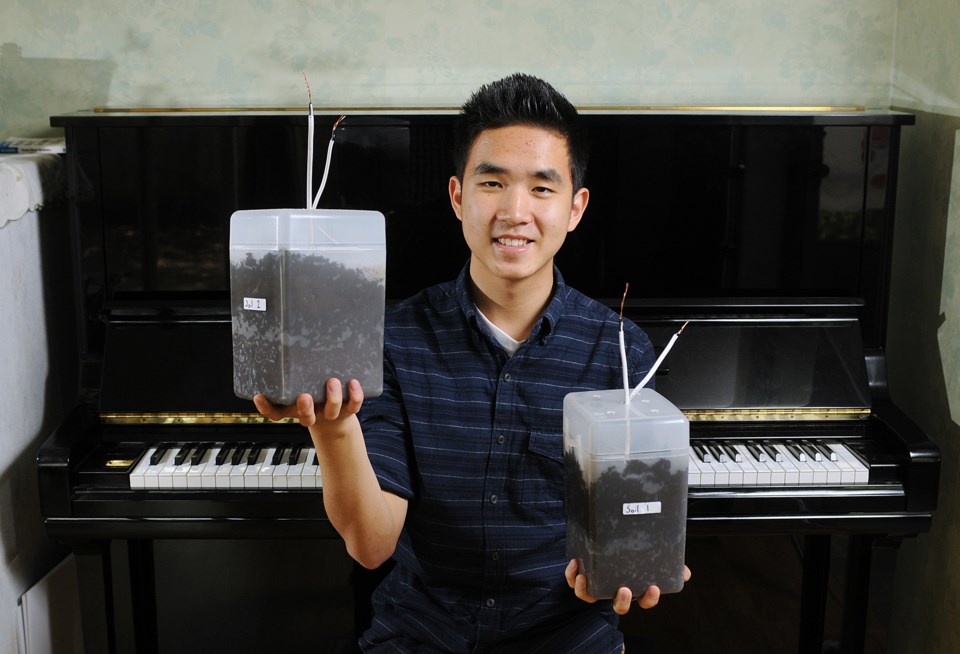When teen Austin Wang considers his amazing success in both music and science, he credits the patience of his parents.
“I have to thank them for letting me bring all this steer manure into the home,” said Wang, 16. “We leave it in our hallway at home and it smells absolutely terrible.”
The manure comes with his passion for the potential of microbial biofuel cells. The musical success flows from playing the piano since he was six and composing his own tunes.
And he isn’t the only one who appreciates his passions. The Killarney resident has won seven science honours in the last two months and a music composition contest that will take him to Vienna in August.
Wang’s microbial fuel cells won him:
- the award for the project with the most commercial potential in April at the regional Sanofi BioGENEius Challenge Canada, and fifth at Sanofi overall
- a gold medal and two other awards at the Greater Vancouver Regional Science Fair in April and took him to Windsor, Ont., for the Canada-Wide Science Fair, where he won silver
- top honours in the DuPont Challenge Science Essay Competition.
Wang attends the David Thompson Odyssey mini school in Victoria-Fraserview, which provides accelerated learning with an academic focus for gifted students. Wang’s physics teacher told the class they could write a mid-year exam or write the DuPont competition essay.
“I really didn’t expect to win anything,” Wang said. “I just wanted to not do the exam.”
Entering a science fair was mandatory at Odyssey in Grade 8. Wang enjoyed the experience so continued entering competitions.
He worked with hydrogen fuel cells at the Grade 8 science fair, started researching microbial fuel cells on his own in Grade 9 and worked at a lab at the University of B.C. this year.
“This technology is really interesting because it’s kind of like a three-in-one device,” said Wang.
With microbial fuel cells, Wang can produce electricity, treat wastewater and produce clean water.
He packs steer and mushroom manure, river sediment and garden soil into plastic boxes with wires and electrodes to harness a natural process that sees exoelectrogenic bacteria break down organic matter, extract electrons and with electrodes create energy.
He can power an LED light but research has shown such fuel cells could be used in roofs to power all of the electricity in a home.
His friends encouraged him to seek out musical composition competitions during a school trip in Japan last year. Friends would give Wang four notes and he’d use them to improvise a new song.
“I decided it might be a good idea, just to motivate myself, to set a deadline to actually write something down,” Wang said.
“Friends and family have been a huge part in what I’ve been able to accomplish,” said the lone child of a father who’s a locksmith and a mother who works in the home.
Wang plans to research another aspect of microbial fuel cells next year and to continue teaching piano to kids, playing and composing.
“I have a feeling [my love of music is] going to keep going through my entire life,” he said.
Sacrificing sleep and playing school basketball this year are outweighed by the fun of pursuing his passions.
Wang couldn’t say which accomplishment has brought him the most enjoyment.
“I work hard for everything,” he said, “but, ultimately, I think everything is just a huge blessing from God.”



